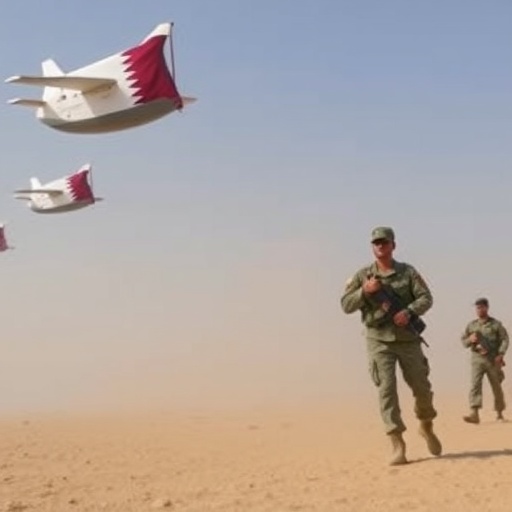Trump Floats Qatar Troops for Gaza Peacekeeping as Ceasefire Talks Heat Up with Rubio’s Involvement
In a bold move that could reshape the fragile dynamics of Middle East peace efforts, former President Donald Trump has suggested that Qatar might deploy troops to a potential Gaza peacekeeping force. This revelation came during high-level discussions with Qatari leaders, signaling a potential shift in international involvement in the ongoing Gaza conflict. As ceasefire negotiations gain momentum, Trump‘s comments underscore his continued influence on global diplomacy, even outside formal office.
The proposal emerges amid escalating tensions in Gaza, where over 40,000 lives have been lost since the conflict intensified in October 2023, according to United Nations estimates. Trump’s statement highlights Qatar’s growing role as a mediator, potentially bridging divides between Israel, Hamas, and other regional players. With Secretary of State Marco Rubio expected to join the talks, the U.S. appears poised to play a pivotal role in facilitating this unprecedented contribution.
Trump’s Surprise Proposal During Qatar Summit
Donald Trump, speaking at a private summit with Qatari officials in Washington, D.C., on Wednesday, openly floated the idea of Qatari troops joining a multinational peacekeeping mission in Gaza. “Qatar has been a fantastic partner in the region, and they could send a force that brings stability to Gaza like never before,” Trump stated, according to sources close to the discussions. This comes as part of broader ceasefire talks aimed at halting the violence that has displaced nearly 2 million Palestinians and drawn international condemnation.
The summit, which lasted over four hours, focused on humanitarian aid corridors and long-term security arrangements. Trump’s involvement is not surprising given his history of unconventional diplomacy, including his administration’s Abraham Accords that normalized relations between Israel and several Arab states. Qatar, a wealthy Gulf nation with a population of just 2.8 million, has long mediated between conflicting parties, hosting Hamas leaders in Doha and facilitating aid to Gaza worth billions of dollars since 2012.
Experts note that Trump’s proposal could leverage Qatar’s unique position. “Qatar’s soft power in the region makes them an ideal candidate for peacekeeping,” said Dr. Emily Carter, a Middle East analyst at the Brookings Institution. “Their troops could symbolize Arab unity without the baggage of larger powers like Saudi Arabia.” However, challenges remain, including Israel’s potential reluctance to accept foreign troops on its borders and Hamas’s demands for full sovereignty.
Rubio’s Entry Signals U.S. Commitment to Gaza Ceasefire
Adding weight to the discussions, Secretary of State Marco Rubio is slated to participate in upcoming rounds of talks, potentially as early as next week. Rubio, known for his hawkish stance on Iran and support for Israel, brings a blend of diplomatic experience and firm resolve to the table. “The U.S. under this administration will not stand idly by while Gaza burns,” Rubio told reporters outside the State Department, emphasizing the need for a “robust peacekeeping presence” to enforce any ceasefire agreement.
Rubio’s involvement marks a departure from previous U.S. approaches, which have often prioritized bilateral Israel-Palestine negotiations. In recent months, the State Department has ramped up efforts, allocating an additional $500 million in aid to Gaza through Qatari channels. This funding has supported everything from medical supplies to temporary shelters, but experts argue it’s insufficient without a security framework. “Peacekeeping troops could prevent the ceasefire from unraveling, much like UN forces in Lebanon,” Rubio added in a prepared statement.
The Qatar-Gaza nexus is particularly intriguing. Doha has invested over $1.5 billion in Gaza reconstruction since 2014, including funding for schools and hospitals. Yet, Qatar’s military is relatively small, with about 12,000 active personnel, mostly focused on defending against threats from neighbors like Iran. Deploying even a modest contingent—say, 500-1,000 troops—would be a significant escalation, requiring coordination with the Gulf Cooperation Council and possibly NATO allies.
Qatar’s Evolving Role in Middle East Peacekeeping Efforts
Qatar’s potential troop contribution represents a seismic shift from its traditional behind-the-scenes mediation to active peacekeeping involvement. Historically, the emirate has avoided direct military entanglements, preferring economic leverage through its vast natural gas reserves—the third-largest in the world. But recent events, including the October 7, 2023, Hamas attack on Israel and the subsequent war, have pushed Qatar toward more assertive diplomacy.
Emir Tamim bin Hamad Al Thani, who met with Trump, has personally engaged with Israeli Prime Minister Benjamin Netanyahu and Egyptian President Abdel Fattah el-Sisi to broker truces. In one notable instance last year, Qatari mediators secured a seven-day ceasefire that allowed 1,000 aid trucks to enter Gaza, averting a humanitarian catastrophe. “Qatar’s willingness to commit troops could be the game-changer needed for lasting peace,” said Ahmed Al-Khatib, a Doha-based diplomat, in an interview with Al Jazeera.
However, domestic and regional hurdles loom large. Within Qatar, public opinion is divided; while many support Palestinian causes, sending troops to a volatile zone like Gaza risks backlash. Regionally, rivals like Saudi Arabia and the UAE, which view Qatar’s Hamas ties with suspicion, might oppose the move. The UAE, for instance, has normalized ties with Israel and hosts U.S. military bases, creating potential friction. Statistics from the Stockholm International Peace Research Institute show Qatar’s defense spending at $6.5 billion in 2023, up 15% from the previous year, indicating readiness for expanded roles but not unlimited capacity.
To contextualize, peacekeeping missions elsewhere provide a blueprint. The UN’s UNIFIL in Lebanon, with over 10,000 troops from 50 countries, has maintained a fragile peace since 1978 despite sporadic clashes. A similar force in Gaza could monitor borders, disarm militants, and oversee reconstruction, potentially involving Qatar alongside Jordanian or Egyptian units. Trump’s vision, as described by aides, includes a “Gaza Security Zone” patrolled by this multinational group, funded partly by Gulf states.
Challenges and Risks in Deploying Troops to Gaza
While Trump’s proposal and Rubio’s participation inject optimism, deploying Qatari troops to Gaza is fraught with risks. The enclave, measuring just 141 square miles and home to 2.3 million people, is a tinderbox of militancy and desperation. Hamas, designated a terrorist group by the U.S. and EU, controls much of the territory and has rejected past peacekeeping ideas as infringing on sovereignty.
Israeli officials have expressed cautious interest but insist on veto power over any force composition. “We welcome stability, but not at the expense of our security,” said an Israeli Foreign Ministry spokesperson. Past attempts at peacekeeping, like the short-lived 2005 disengagement monitoring, collapsed amid rocket fire and incursions. Moreover, logistical nightmares abound: Gaza’s infrastructure is 70% destroyed, per World Bank assessments, making troop deployment akin to operating in a war zone.
Geopolitically, Iran’s influence complicates matters. Tehran backs Hamas and other proxies, and any Qatari move could provoke escalation. Qatar shares the world’s largest natural gas field with Iran, giving it leverage but also vulnerability. A think tank report from the Council on Foreign Relations warns that peacekeeping without addressing root causes—like the blockade and settlements—could fail spectacularly, costing lives and billions.
Despite these obstacles, proponents argue the upside is immense. A successful ceasefire with peacekeeping could unlock $20 billion in reconstruction funds pledged by international donors, revitalizing Gaza’s economy, which has shrunk 35% since the war began. Interviews with Gazan residents reveal a desperate plea for security: “We need boots on the ground to stop the bombs, no matter who wears them,” said one anonymous shopkeeper in Khan Younis.
Trump’s track record adds intrigue. During his presidency, he relocated the U.S. embassy to Jerusalem and brokered deals that sidelined Palestinians, drawing criticism. Yet, his rapport with Gulf leaders, forged through arms deals worth $100 billion, positions him uniquely to rally support. Rubio, a Florida senator before his cabinet role, has advocated for stronger U.S.-Qatar ties, including joint military exercises in the Gulf.
Path Forward: Ceasefire Prospects and Global Repercussions
As these talks progress, the focus shifts to implementation. Upcoming meetings in Doha, expected to include Egyptian and Turkish representatives, will hash out force details—troop numbers, rules of engagement, and funding. The U.S. has signaled willingness to lead training, drawing on its 2,500 troops already in Qatar at Al Udeid Air Base, the largest U.S. military installation in the Middle East.
Optimists point to momentum: Recent polls by the Arab Barometer show 65% of Arabs favoring multinational peacekeeping in Gaza, up from 45% pre-war. If Qatar commits, it could inspire others; Jordan, with its battle-hardened forces, has hinted at participation. For Trump, success here bolsters his narrative as a peacemaker, potentially influencing U.S. elections and his post-presidency legacy.
Yet, the road ahead is uncertain. A fragile ceasefire without enforcement has collapsed thrice since 2023, each time worsening the humanitarian crisis—famine risks affect 500,000 Gazans, per IPC reports. Rubio’s diplomacy will be tested, balancing Israeli security with Palestinian aspirations. Qatar’s decision, expected within months, could either herald a new era of stability or expose the limits of Gulf intervention.
Ultimately, this proposal spotlights the urgent need for innovative solutions in Gaza. With Trump’s endorsement and Rubio’s backing, the stars may align for a peacekeeping force that finally tips the scales toward peace, offering hope to a region weary of endless conflict.








